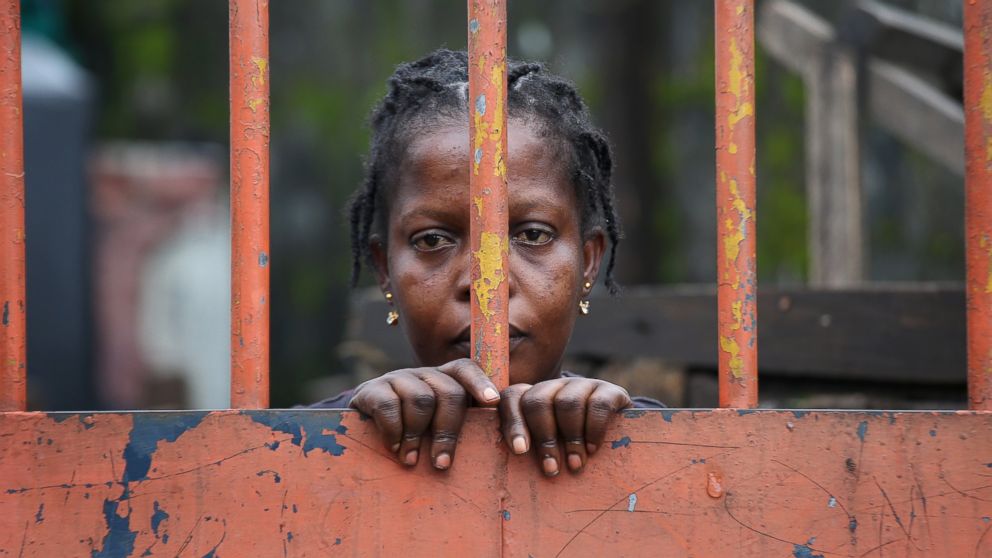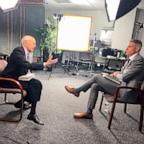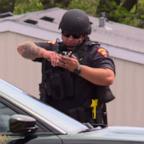Ebola Outbreak Enters Sixth Month With No End in Sight
Treatment centers are overflowing as officials warn of disease "shadow zones."

— -- intro: Though two American aid workers have recovered from Ebola, the outbreak continues to spread in West Africa with no end in sight.
At last count, the virus had killed at least 1,427 people and sickened 1,188 more – numbers thought to “vastly underestimate” the outbreak’s true toll, according to the World Health Organization.
Click here for more headlines from the Ebola outbreak.
The outbreak emerged in March and quickly became the deadliest on record. An estimated 48 percent of all Ebola deaths recorded since the virus's discovery in 1976 have occurred in the last five months, according to WHO data.
Here are 10 things you should know about the outbreak as fears continue to mount in Guinea, Liberia, Sierra Leone, Nigeria and beyond.
quicklist: 1category: What’s Happening Now in the Ebola Outbreak title: American Ebola Survivors Leave Hospitaltext: Dr. Kent Brantly, 33, and missionary Nancy Writebol, 59, have been discharged from Emory University Hospital, where they were being treated for Ebola. They contracted the virus while working with aid groups in Liberia.
Brantly left the hospital Thursday, calling it a “miraculous day” as he stood surrounded by the Emory Medical staff for a press conference.
"I am thrilled to be alive, to be well, and reunited with my family," he said.
Moments later, he hugged about a dozen Emory health care workers. Though he underwent blood and urine tests to be sure the virus was no longer in his system, the hugs helped ease people’s fears about his release, experts said.
Writebol, whose quiet discharge from the hospital happened Tuesday, seemed “strong” and “thankful” when she spoke to her pastor Jim Cashwell in Charlotte, Cashwell told ABC affiliate WSOC.
Why American Ebola Survivor Got So Many Hugs
media: 25070020
quicklist: 2category: What’s Happening Now in the Ebola Outbreak title: U.S. Hospitals Taking No Chancestext: Hospitals and state labs across the country have reported 68 possible Ebola cases to the CDC over the last three weeks. Only 10 of these patients raised CDC’s concerns enough to test their blood for the virus, and all of the results have come back negative so far.
The latest scare involved a patient at Kaiser Permanente South Sacramento Medical Center in California, whose negative test results were announced Thursday.
Potential Ebola patients at Mount Sinai Hospital in New York, Johns Hopkins Medicine in Maryland, University of New Mexico Hospital in Albuquerque and an undisclosed hospital in Ohio have also tested negative for Ebola over the past several weeks.
The CDC had sent a health alert to hospitals across the country urging them to ask patients about their travel history to help identify potential Ebola cases.
media: 24892801
quicklist: 3category: What’s Happening Now in the Ebola Outbreak title: Officials Warn of ‘Shadow Zones,’ ‘Invisible’ Casestext: The Ebola outbreak is already the deadliest on record, and WHO officials say the impact may be far worse than reported.
The number of known infections – currently 2,473 – is underestimated because of those who hide the infected and bury the dead in secret, WHO said in a statement today. The number also excludes so-called “shadow zones,” which are rumored to have Ebola cases that go unconfirmed because of community resistance and a lack of medical staff, the agency said.
Health officials also suspect an “invisible caseload” in Liberia because new treatment facilities are filling with previously unidentified Ebola patients as soon as they open.
Ebola Toll May 'Vastly Underestimate' Crisis
media: 24995700
quicklist: 4category: What’s Happening Now in the Ebola Outbreak title: 1 in 4 Americans Fears Ebola Outbreak, Poll Showstext: About a quarter of Americans fear that they or someone in their family will come down with Ebola in the next year, according to a Harvard School of Public Health poll released today.
Harvard and SSRS, an independent research company, conducted the poll of 1,025 adults last week and found that 39 percent of respondents feared a large Ebola outbreak in the United States.
According to the poll, 68 percent of Americans thought the disease could spread “easily” and 33 percent said they thought there was an available treatment for it, highlighting a lack of understanding about Ebola in this country. In reality, the virus is only transmitted through contact with body fluids like blood and urine, and there is no cure. It’s unclear whether ZMapp, the unofficial drug given to the American Ebola patients, helped or hindered their recovery, experts say.
media: 25085624
quicklist: 5category: What’s Happening Now in the Ebola Outbreak title: New Nigerian Cases Linked to Sick Plane Passenger text: Two Nigerians have been diagnosed with Ebola after their spouses helped treat American-Liberian Patrick Sawyer.
Sawyer flew from Liberia to Nigeria with Ebola and was quarantined when the plane landed, but he had already infected 11 people, the Associated Press reported. He died in July.
Of the 13 Nigerian patients, four have died, five have recovered and four are still in isolation, according to the AP.
media: 25022174
quicklist: 6category: What’s Happening Now in the Ebola Outbreaktitle: Drug Companies Are Rushing to Provide Treatmentstext: The growing outbreak has left pharmaceutical companies scrambling to test drugs that could treat and prevent the infection.
There is currently no drug approved to fight Ebola, but WHO has allowed medical professionals to use experimental or untested medications in a last ditch effort to save lives.
One drug, an experimental treatment known as ZMapp, has been used to treat six patients: American health workers Dr. Kent Brantly and Nancy Writebol, a Spanish priest, two African doctors and one African nurse. Brantly and Writebol survived but the Spanish priest did not. The African health care workers are showing signs of improvement, according to the AP.
Still, experts say it’s unclear whether ZMapp -- a cocktail of three antibodies that attack the virus – actually helped those who received it. Before Brantly received his dose, the drug had only been tested in monkeys.
"Frankly we do not know if it helped them, made any difference, or even delayed their recovery," said Dr. Bruce Ribner, director of Emory’s infectious disease unit, where Brantly and Writebol were treated.
Experimental Ebola Drug's Role in Americans' Recoveries Remains Unclear
Another drug, an Ebola vaccine developed by the U.S. National Institute for Health, is scheduled to be tested on humans for the first time in September. Another vaccine out of Canada is also expected to be tested, the Associated Press reported.
media: 24995866
quicklist: 7category: What’s Happening Now in the Ebola Outbreak title: Officials Request Exit Screenings at Airports, Seaportstext: The World Health Organization has requested exit screenings at international airports, seaports and land crossings in all countries affected by the Ebola outbreak.
“Any person with an illness consistent with [Ebola virus disease] should not be allowed to travel unless the travel is part of an appropriate medical evacuation,” WHO said in a statement. “There should be no international travel of Ebola contacts or cases, unless the travel is part of an appropriate medical evacuation.”
Ebola symptoms include fever, weakness, muscle pain and sore throat before they progress to vomiting, diarrhea and rash. Some people may also experience bleeding.
The WHO Ebola Emergency Committee advised against international travel or trade restrictions at this time.
media: 25023911
quicklist: 8category: What’s Happening Now in the Ebola Outbreaktitle: Governments Are Reviving the ‘Cordon Sanitaire’ text: Officials from Guinea, Sierra Leone and Liberia have implemented a “cordon sanitaire” or sanitary barrier – a cross-border isolation zone designed to contain people with the highest infection risk.
The tactic, used to prevent the spread of plague in medieval times, literally blocks off an area thought to contain 70 percent of the epidemic. But some experts say there’s little proof that isolation zones can prevent the spread of disease.
Ebola-Stricken Countries Turning to Ancient Practice to Curb Outbreak
“It may not be sufficiently structured so it can prevent people from leaving,” said Dr. William Schaffner, an infectious disease expert at Vanderbilt Medical Center in Nashville, Tennessee.
media: 24963972
quicklist: 9 category: What’s Happening Now in the Ebola Outbreaktitle: Fearful Communities Are Shunning Survivorstext: An estimated 47 percent of people infected in the outbreak have survived the virus, according to WHO. But they face fear and shame from their communities.
Survivor Sulaiman Kemokai, from Sierra Leone, said people in his community are afraid to touch him even though he’s been declared virus-free, the Associated Press reported.
Ebola Survivor Shunned by Boyfriend, School
The Ebola virus can only be spread through contact with bodily secretions such as blood, urine or sweat. But misinformation is rampant in areas hardest hit by the virus, health officials said.
media: 24996260
quicklist: 10
category: What’s Happening Now in the Ebola Outbreaktitle: FDA Warns Against Fake Ebola Treatments text: The U.S. Food and Drug Administration is warning people to avoid fake Ebola treatments and vaccines being sold online. The agency said products claiming to protect people from the infection began popping up online after the outbreak began in March.
“There are currently no FDA-approved vaccines or drugs to prevent or treat Ebola,” the agency said in a statement. “Although there are experimental Ebola vaccines and treatments under development, these investigational products are in the early stages of product development, have not yet been fully tested for safety or effectiveness, and the supply is very limited."
"There are no approved vaccines, drugs, or investigational products specifically for Ebola available for purchase on the Internet," the FDA added. "By law, dietary supplements cannot claim to prevent or cure disease.”
media: 24995990




